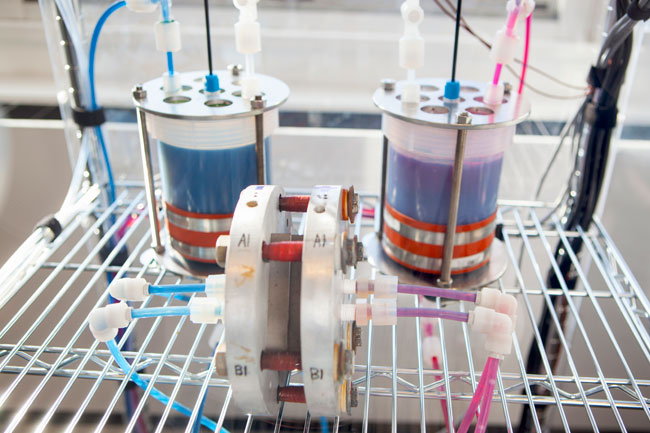Last Updated on February 15, 2017 by Editor Futurescope
More than 80% of the energy used in the world comes from fossil fuels, mainly coal, oil and gas, non-renewable resources that have a huge impact on global pollution. Efforts have been made for decades to reduce, even supplant, the use of non-renewable energy through the use of clean energy. While alternatives such as solar or wind energy have overcome the stumbling block of generation, now the challenge lies in being able to store that energy, so that it is available when it is required. A Flow Battery may doing that!
An inexpensive flow battery uses neutral water as solvent and withstands many thousands of charge cycles without degrading.
There is news that has not yet been announced by politicians: the lifestyle we have maintained until now is impossible to maintain, we have simply reached the energy, geological, climatic and ecological limits of planet Earth.
As we do not want to assume this objective fact, we continue in a forward flight in which we organize wars for the resources, we pollute and we destroy the oceans and the climate of the Earth.
We can believe that renewable energies and using electricity as an energy vector may be possible to maintain that lifestyle, but that is not possible, especially at the runaway pace of exponential economic and population growth. We could maintain a decent and happy lifestyle, without many children and luxuries, but that style of life is not the one pushed by the economic system.
Those 8 lords with as much wealth as the world’s poorest 3500 million will not be resigned. And, even if we ask it well and please, those gentlemen (and many others) are not going to distribute their wealth to save the planet and humanity.
In the future with a shortage of fossil energy, poverty and energy inequality will be widespread. If we believe that all the cars of the near future will be electric will have to remove lithium from another planet, there will not be enough for so much battery. The rich man will drive his Tesla, you poor reader, no.
If at any moment we think and decide to live a more austere but happier life, we will have to implement new technological ideas that allow us to live worthily with renewable energies.
Photovoltaic solar energy has become significantly cheaper in recent years. It is already possible to power a house economically with this type of energy. As long as we do not try to store it, of course. Because the problem remains the same: the issue of batteries.
Lithium is not as abundant in the earth’s crust and cheap as we would like, and above, it is expensive to extract from the energetic point of view. In addition, a lithium battery holds a maximum of a thousand cycles and then has to be replaced by a new one. This means that if we put a lithium batteries to store the electricity that a single-family house produces with its solar panels and wind turbines, then in a few years we will have to change them.
The solution is to develop other types of batteries that, although large, heavy and cumbersome, will withstand many more charge cycles and be made with elements that are not scarce or expensive.
A group of scientists at Harvard University’s Institute of Applied Sciences are working to perfect and massify the use of clean energy. They are building a promising battery, which, in addition to reducing production costs, would allow long- Minimum maintenance.
Undoubtedly, one of the biggest annoyances of batteries is the short duration most of them.
For this reason, a great solution is the use of the so-called flow batteries, consisting of a rechargeable battery composed of two chemical compounds dissolved in liquids separated by a membrane through which a flow of electrons is formed that gives rise to electric current.
The new flow battery stores energy in organic molecules dissolved in neutral pH water. This new chemistry allows the flow battery to be non-toxic or corrosive, with an exceptional long service life and also offers the potential to significantly reduce production costs.
A flow battery is a battery in which the electrolyte flows through an electrochemical cell that converts chemical energy into electricity; these batteries recharge quickly and more electrolyte can be stored in tanks, therefore, the energy capacity of the system is determined by the size of the tanks.
Flow batteries are presented as a promising solution for storing energy generated from intermittent sources such as that produced by the sun or wind; However, current flow batteries degrade in their storage capacity after undergoing charging and discharging cycles, requiring periodic maintenance of the electrolytes to restore their cumulative property.
By modifying the structures of the molecules used in positive and negative electrolyte solutions, and by making them soluble in water, the Harvard team was able to design a battery that loses only 1% of its capacity for every 1000 cycles of Charging and recharging.
An important aspect involved in the work done by scientists is cost reduction. The US Department of Energy has set itself the goal of building a flow bank, which can store energy at a low cost, and offer an economically competitive alternative to the energy produced by traditional power plants.
This work on soluble organic electrolytes is of great importance and offers a vision for the future. The production of an energy storage medium that is efficient, durable and with a low cost of production, could become, in the near future, an essential standard in the infrastructure of the electric network.
Unfortunately, everything has its pros and cons and while being rechargeable makes these batteries a great alternative to conventional batteries, it also has important defects, such as corrosion and toxicity of its components or the annoying need to Change them every few minutes to restore the energy holding capacity.
But that is over, or at least could be over, as a team of researchers at the John A. Paulson School of Engineering and Applied Science at Harvard has designed a battery prototype that eliminates all these drawbacks by using neutral water as a solvent and Modified organic molecules as dissolved compounds.
FLOW BATTERY THAT COULD LAST MORE THAN 10 YEARS
The study data have been collected in ACS Energy Letters, an article that tells the steps through which these researchers sought to solve virtually all the drawbacks of conventional flow cells.
To begin with, they considered that the main problem of other batteries is the use of acids as solvents, since they can generate corrosion in the own interior of the pile, besides being susceptible to participate in dangerous accidents.
Therefore, they decided to substitute these acids for water with neutral pH, incapable to produce any type of corrosion. But what happened then with the dissolved compounds? Often as non-water soluble substances are used as cathode and anode, so a new drawback will be generated.
But they also had a solution for this, since they modified two of the molecules used in these cases in order to make them more efficient and eliminate their main drawbacks.
Thus, to begin with, they focused on viologen, which was normally used as a negative electrolyte, but it had the great disadvantage of being degraded very quickly, necessitating its replacement. Thus, they modified their molecular structure so that their beneficial properties were maintained while increasing their resistance to degradation.
On the other hand was the ferrocene, usually used as positive electrolyte. In this case, it is a fairly resistant substance, but totally insoluble in water, so it was necessary to also modify its structure to make it dissolve in it.
DURABLE AND CHEAP
And we are ready. Thanks to these modifications were a durable battery, nothing corrosive and, especially, cheap, since it was not necessary to use expensive materials for the generation of membranes resistant to corrosion.
The use of this type of batteries is perfect to couple them to systems of obtaining renewable energies, in which the intermittent production of energy makes necessary the search of efficient ways of storing it.
And if above is achieved that the battery lasts without any maintenance for more than a decade, better than better. Get over it, Flow Battery!









